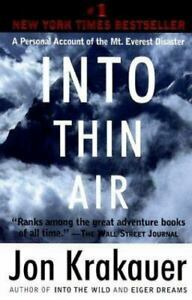Take a photo of a barcode or cover
adventurous
challenging
fast-paced
adventurous
dark
informative
sad
medium-paced
adventurous
dark
informative
sad
tense
fast-paced
adventurous
dark
reflective
sad
tense
slow-paced
Why are we still going to Everest!?!?
dark
informative
tense
medium-paced
This is a tough book to review. I think a lot of people are quick to pick sides, and that a lot of people still look for something easy to blame. I unfortunately forgot to highlight this quote, but I found “only the mountain will know what really happened” to be quite eloquent.
A couple of points I thought about while reading:
- Krakauer makes a point about the kind of person it takes to be a mountaineer. Some people cannot be satisfied with “normal” hobbies, and are thus drawn to such extremely sports where the threat of death is always looming. I find this both fascinating and arrogant.
- The hubris of man is staggering. A bunch of rich (mostly) white men (and women) can buy their way into an experience such as this and think they can conquer Mother Nature. They endanger their lives, the lives of the guides, and the lives of the Sherpas essentially to chase this never-ending high and need for clout.
- You can make an argument that the Sherpas rely on this work, but they are 100% taken advantage of, and I found it gross.
- I think Krakauer had a just portrayal of Boukreev, and I’m surprised more people take such extreme positions. Krakauer noted what decisions he disagreed with (particularly that of the supplemental oxygen and descending ahead of the clients), but he gives due credit to his heroic actions in rescuing Pittman and Fox. My impression is that Krakauer and Boukreev both suffered from ego issues, which unfortunately resulted in such tensions following the disaster of 1996.
- Krakauer concedes that some of his actions/inactions may have contributed to the deaths, but overall, he does portray himself preeetty well in comparison to some other clients. He doesn’t necessarily come out and say outright when he disapproves of their decisions, but it’s very strongly implied.
- Typically in the face of disaster, there’s usually some staggering account of an incredible display of compassion and humanity. I was taken aback by the distinct lack of this and the emotional neutrality when encountering the corpses that litter the slopes of Everest.
- Every single account that came from the disaster in 1996 is different, and nobody will ever really know what happened that day.
All this being said, this is my sea-level clear-headed fully-oxygenated impression. I can’t really fault anyone for the numbness and shock in the face of such a harrowing experience and cruel environment…which is why maybe some things should be left unconquerable by mankind.
A couple of points I thought about while reading:
- Krakauer makes a point about the kind of person it takes to be a mountaineer. Some people cannot be satisfied with “normal” hobbies, and are thus drawn to such extremely sports where the threat of death is always looming. I find this both fascinating and arrogant.
- The hubris of man is staggering. A bunch of rich (mostly) white men (and women) can buy their way into an experience such as this and think they can conquer Mother Nature. They endanger their lives, the lives of the guides, and the lives of the Sherpas essentially to chase this never-ending high and need for clout.
- You can make an argument that the Sherpas rely on this work, but they are 100% taken advantage of, and I found it gross.
- I think Krakauer had a just portrayal of Boukreev, and I’m surprised more people take such extreme positions. Krakauer noted what decisions he disagreed with (particularly that of the supplemental oxygen and descending ahead of the clients), but he gives due credit to his heroic actions in rescuing Pittman and Fox. My impression is that Krakauer and Boukreev both suffered from ego issues, which unfortunately resulted in such tensions following the disaster of 1996.
- Krakauer concedes that some of his actions/inactions may have contributed to the deaths, but overall, he does portray himself preeetty well in comparison to some other clients. He doesn’t necessarily come out and say outright when he disapproves of their decisions, but it’s very strongly implied.
- Typically in the face of disaster, there’s usually some staggering account of an incredible display of compassion and humanity. I was taken aback by the distinct lack of this and the emotional neutrality when encountering the corpses that litter the slopes of Everest.
- Every single account that came from the disaster in 1996 is different, and nobody will ever really know what happened that day.
All this being said, this is my sea-level clear-headed fully-oxygenated impression. I can’t really fault anyone for the numbness and shock in the face of such a harrowing experience and cruel environment…which is why maybe some things should be left unconquerable by mankind.
adventurous
challenging
emotional
informative
sad
tense
medium-paced
Oof, this book was tough. I felt so bad for John and his companions and also have lost any desire to ever go on an Everest expedition!
By the end of this book I had been fully convinced that commercial expeditions of Everest should be banned unless strict regulations are put in place. Many of the people involved with the numerous commercial expeditions of Everest in 1996 treated it like a game. The expedition leader who was overly confident, saying that getting his clients to the summit is a piece of cake. A different expedition leader whose lackadaisical approach left many of his expedition members unprepared and not properly acclimated to the altitude. And the numerous climbers with very little ice climbing experience who believed all they needed was to pay enough money and they would deserve to reach the summit. Everest isn't a game, it's incredibly dangerous, it isn't there to stroke the egos of the rich and foolhardy.
The book itself is incredibly well written, I would expect nothing less from Krakauer. But I came away from this book so incredibly angry about the actions by many involved that, along with the storm, caused the unnecessary deaths of so many people. And for what?
The book itself is incredibly well written, I would expect nothing less from Krakauer. But I came away from this book so incredibly angry about the actions by many involved that, along with the storm, caused the unnecessary deaths of so many people. And for what?
Being a woman that loves to lose herself in a fantasy setting, I have spent many of my reading years actively avoiding non-fiction books. I had a lot of preconceived notions about non-fiction, chief among them being that they all read like stale textbooks. As I got older, though, I decided to dip my toes into the genre and ended up picking up A Walk in the Woods by Bill Bryson. I absolutely LOVED it and, just like that, a whole new genre was opened before me.
The main thing I loved about A Walk in the Woods was the narrative writing style. It was far from dry; it was witty and interesting and I couldn’t put it down. As I looked for more non-fiction books to read, I tried to find books that were written in a similar style. Someone suggested Into the Wild by Jon Krakauer, the story of a young man named Christopher McCandless who leaves his life behind to try and survive in the Alaskan wilderness. I was not disappointed. Krakauer definitely wrote with a conversational tone that sucked me into the story and held me in its grip until the end. So, when I noticed that his book about his experience on Mount Everest was available from Book of the Month Club, I picked it up.
So. This book. The delivery was similarly well received by me, but this book still fell flat. And I think it was because of the topic. Not because of the tragedy, though that was rather hard to read, but because mountain climbing just sounds AWFUL. The entire time I was reading this book, I couldn’t stop thinking, “Why are you people willingly putting yourselves through this?!” Krakauer goes into detail about the effects high altitude climbing has on the human body and NONE of it is pleasant. I suppose I get that people do it for the clout, but even reading this account from the viewpoint of a former climbing addict, I just… could not understand the appeal. And that made the tragedy seem that much more pointless.
I did enjoy Krakauer’s attempt to broach the subject of the commercialization of Mount Everest. I felt he spent a decent amount of time discussing what professional climbers felt about the subject and how climbing guides felt. I don’t think enough time was spent discussing how the commercialization has affected Nepal and the Sherpas, but I understand that it wasn’t meant to be the focus of the book. The focus was the tragedy and Krakauer’s attempt to try and give the most accurate account possible. Still, I felt like a little more time could have been spent exploring this topic.
Final thoughts: Though I still enjoyed Krakauer’s writing style, this topic and I just didn’t jive. Also, I will NEVER go mountain climbing. No thank you.
The main thing I loved about A Walk in the Woods was the narrative writing style. It was far from dry; it was witty and interesting and I couldn’t put it down. As I looked for more non-fiction books to read, I tried to find books that were written in a similar style. Someone suggested Into the Wild by Jon Krakauer, the story of a young man named Christopher McCandless who leaves his life behind to try and survive in the Alaskan wilderness. I was not disappointed. Krakauer definitely wrote with a conversational tone that sucked me into the story and held me in its grip until the end. So, when I noticed that his book about his experience on Mount Everest was available from Book of the Month Club, I picked it up.
So. This book. The delivery was similarly well received by me, but this book still fell flat. And I think it was because of the topic. Not because of the tragedy, though that was rather hard to read, but because mountain climbing just sounds AWFUL. The entire time I was reading this book, I couldn’t stop thinking, “Why are you people willingly putting yourselves through this?!” Krakauer goes into detail about the effects high altitude climbing has on the human body and NONE of it is pleasant. I suppose I get that people do it for the clout, but even reading this account from the viewpoint of a former climbing addict, I just… could not understand the appeal. And that made the tragedy seem that much more pointless.
I did enjoy Krakauer’s attempt to broach the subject of the commercialization of Mount Everest. I felt he spent a decent amount of time discussing what professional climbers felt about the subject and how climbing guides felt. I don’t think enough time was spent discussing how the commercialization has affected Nepal and the Sherpas, but I understand that it wasn’t meant to be the focus of the book. The focus was the tragedy and Krakauer’s attempt to try and give the most accurate account possible. Still, I felt like a little more time could have been spent exploring this topic.
Final thoughts: Though I still enjoyed Krakauer’s writing style, this topic and I just didn’t jive. Also, I will NEVER go mountain climbing. No thank you.
adventurous
emotional
informative
reflective
sad
tense
medium-paced
Översättningen till svenska av Jan Järnebrand uppfattades ibland som bristfällig.





